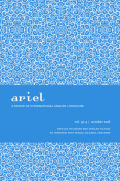Postcolonial Palimpsests: Entwined Colonialisms and the Conflicted Representation of Charles Bon in William Faulkner’s Absalom, Absalom!
Keywords:
Neo-Colonialism, Temporality, Fluidity, Race, SexualityAbstract
This article argues that Charles Bon in William Faulkner’s Absalom, Absalom! (1936) is the embodiment of a fluidity that confronts the efforts to preserve the hierarchies of race, gender, class, and sexuality on which colonialism and neocolonialism depend for coherence and meaning. The biracial, sexually fluid figure of Charles Bon and his contradictory depiction by competing narrators of his tale reveal entwined colonialisms in the US South that complicate the divide between the colonial and neocolonial periods employed in linear surface narratives: Bon is portrayed as living multiple stories of colonialism simultaneously in the novel. With an awareness of the narrators’ divergent colonial mindsets, we can begin to see the ways in which Faulkner uses Bon’s métissage, or blending of cultural, racial, and sexual categories, to confront the resilient colonial mentalities that persist in the twentieth-century American South through imagining an alternative: the acceptance of this fluidity.


